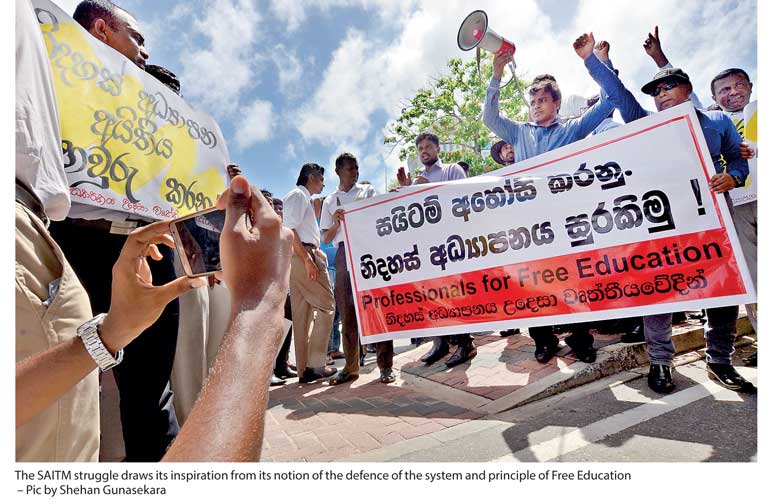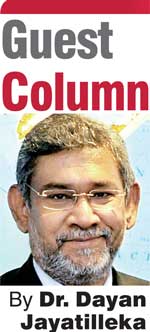Wednesday Feb 18, 2026
Wednesday Feb 18, 2026
Wednesday, 3 January 2018 00:00 - - {{hitsCtrl.values.hits}}


The resumption of rumblings over the SAITM issue, due to concerns about a double-cross by elements of the Government, generated commentary which was revealing. From the Sinhala ultranationalists, where there should be solidarity, there was only resentment, exposing the hollowness of the ideology and discourse.
It is not without reason that Nietzsche warned against “ressentiment” (French for ‘resentment’) and ideologies that arise from it. Their oft-repeated sardonic, slogans were: “There is huge agitation over SAITM but they cannot demonstrate against the new Constitution or the jailing of war heroes!” “They care more about SAITM than the Constitution or war heroes!” “What is the biggest issue today? SAITM!”
Criticising students and doctors for agitating over SAITM rather than the Constitution or the victimisation of war veterans is rather like criticising a trade union for agitating over a matter that directly concerned its sector of industry and its members, instead of demonstrating over larger national issues. It is like criticising a person with an acute stomach ache of not complaining more loudly about a headache In this line of argument the only valid and legitimate issues, or the most valid and legitimate issues by far, are those connected to ‘the nation’. It acknowledges no other social or existential reality.
In the second place this criticism reveals the inadequacy of their notion of the nation itself. It is a nationalism without a social content; national sovereignty without people’s sovereignty; national liberation without social liberation. It is, in effect a thin nationalism—a nationalism without the social dimension. It is a hollow nationalism: a nation without the people, without the masses, without the educated youth.
Those who speak sardonically of the anti-SAITM agitation by the students reveal their ignorance of how a nation can flourish, can compete, can evolve. It needs above all, education, and the guaranteed access to education including higher education, to all the people. That is why a nation which defends itself successfully against the world’s sole superpower, and punches well above its weight in the world arena, namely Cuba, invests far more in education than most nations of the world and spends more on education and research than on its excellent military.
In Sri Lanka, those who enter the State universities do so through a gruelling competitive process. They are drawn from all walks of life, all strata of society, thanks to free education. This would not be the case if higher education were subordinated to market forces and the power of money, instead of the principle of merit. The medical students are the best of the best, the elite.
The anti-SAITM agitation was about the interface of two fundamental principles, egalitarian access (as distinct from backdoor entry through the power of money) on the one hand, and rigorous competition, selectivity and training, i.e. high standards, on the other.
The SAITM struggle draws its inspiration from its notion of the defence of the system and principle of Free Education. Free Education was instituted as a social right by C.W.W. Kannangara in 1944, before national independence and sovereignty in 1948. For the educated, multi-ethnic Ceylonese nationalists of that time, social welfare, labour legislation, Free Education and the striving for independence and sovereignty went together. They understood that egalitarian expansion of educational opportunity was vital for nation-building.
The principle of free education cannot be asked to fall on the sword of the nationalist cause. If the anti-SAITM agitation dwarfed in numbers and forcefulness, the anti-Constitution agitation, it is because those in the anti-Constitution movement no longer know how to reach out to powerful, organised social movements such as students, trade unions and well established movements of the higher professions.
One reason is their narrow, limited discourse. No movement of university students anywhere in the world would relate to an anti-intellectual discourse. No trade union movement, peasant movement or women’s movement anywhere in the world would relate to a nationalism that is utterly insensitive to questions of social justice and equality of rights.
No patriotism or nationalism can succeed without grounding itself in the people; in the various social classes and strata. No nationalism can succeed if it cannot resonate with the educated classes, especially the educated youth led by the university and college students. Throughout history, from China to Cuba, patriotic struggles have been spearhead by the student youth or they have not had any chance of advancing towards success. In order to be adopted by the student youth, nationalism must be combined with social equality and justice as well as with the theme of internationalist solidarity. In Ceylon, the modern anti-imperialist struggle was led by left-wing students with a Western education (the LSSP and CP) and later, with a Sri Lankan education.
No patriotic or nationalist struggle that is radical right-wing in its ideology can strike a chord among the students, and without the students it will have neither the numbers nor the energy and will be limited. Everywhere on the planet, students, especially university students are idealistic; they aspire to the higher ideals and values of solidarity which cuts across race, religion and gender. Furthermore, though there is significant participation of student monks in the university student movement, the ideology of student movements throughout the world is modernist and secular, and decidedly non-theocratic.
There is no nation without the people. There is no national question without a social question. The people are the nation. In the global South, there can be no national liberation without people’s liberation and no people’s liberation without national liberation.
People’s sovereignty is not subordinate to national sovereignty and the national sovereignty and people’s sovereignty must go together. There is no authentic nationalism which is not driven by the people. The great national liberation leader of the Nicaraguans who fought US imperialism in the 1930s, Augusto Cesar Sandino said “only the workers and peasants will go on till the very end”. The Vietnamese and African leaders who fought and defeated US and Portuguese imperialism respectively, in our lifetime, said that ‘The nation and the people are one’! The people are the root of the nation, the constitutive source of the nation.
The victory over the UNP in 1956 and the resultant regime was defined by the US scholar Prof Marshall Singer in a reputed MIT Press book (1964) as that of ‘The Emerging Elite’. The 1956 and 1970 coalitions had formidable intellects in its ranks. Today’s majoritarian neo-nationalist project has failed to generate or attract an elite or win over the future elite that is born in the university system, among the students and staff.
The challenge Sri Lanka faces in the world today is a battle of narratives and a global battle of ideas and ‘lawfare’ (legal warfare) against us, in which the attempt is to delegitimise the war, the military and the Sri Lankan state. This is a war of the intellect, which has to be waged by the higher intelligentsia, those trained in knowledge and ideas. This training is in the universities.
However great the negatives of the Sri Lankan university system and student community, one cannot get away from the fact that it is here that ideas are taught. Every student is educated and tested in the knowledge – the concepts and ideas – in their field. They cannot be reviled by those who have not been taught and therefore have no knowledge of the weapons, tactics, and ammunition and the history of combat of the ideas and concepts that are being used in the global war against Sri Lanka. While the struggle for economic development and modernisation has to be waged by the professional elite, the struggle to defend Sri Lanka in the global arena has to be waged by the intellectuals, led by a vanguard drawn from the higher intelligentsia.
In the global battle of arguments over Sri Lanka, only they can win over or neutralise opinion makers throughout the world, especially but not only in the West, and indeed only they can communicate with the younger, highly educated Sri Lankan Diaspora as well.
In 1970 the electoral toppling of the UNP was spearheaded by the left-wing university student movement and supported by the university academic community, which held public rally after rally and went door to door distributing leaflets and canvassing support for the United Front coalition. While it may not be possible to recreate that alliance, the alienation of the majoritarian nationalists from the powerful student movement and its deeply felt causes and anti-government struggles will help neither the anti-UNP cause nor an anti-UNP candidate.